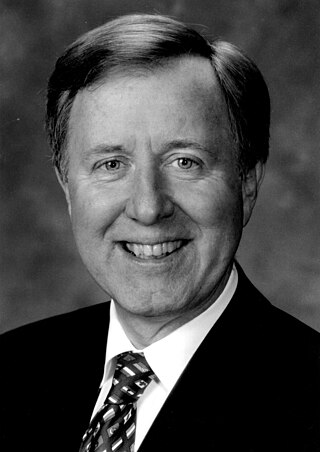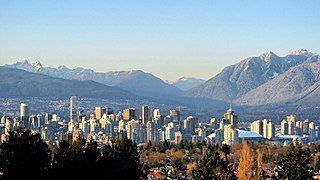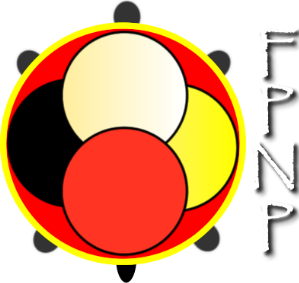The Green Party of British Columbia, or simply the BC Greens, is a provincial political party in British Columbia, Canada. It was founded in 1983 and is based in Victoria. The party won its first seat in the Legislative Assembly of British Columbia in the 2013 provincial election.

The Social Credit Party of Canada, colloquially known as the Socreds, was a populist political party in Canada that promoted social credit theories of monetary reform. It was the federal wing of the Canadian social credit movement.

Ian Gardiner Waddell was a Canadian politician, author and filmmaker. He served in the House of Commons of Canada from 1979 to 1993, and in the Legislative Assembly of British Columbia from 1996 to 2001.

The Reform Party of British Columbia is an unregistered right-wing populist political party in British Columbia, Canada. Although its name is similar to the defunct Reform Party of Canada, the provincial party was founded before the federal party was and it did not have any formal association with it. Their peak of support came in 1996 when they elected two members to the Legislative Assembly of British Columbia.
The BC Action Party is a minor political party in British Columbia that advocates for fiscal responsibility.
The First Peoples Party (FPP) was a short-lived political-party in Manitoba, Canada.

Stuart Parker is a Canadian politician who was the acting leader of the BC Ecosocialists party in 2020 and was the leader of the Green Party in British Columbia, Canada, from 1993 to 2000. In 2009, during the Ontario by-election to replace MPP Michael Bryant, he unsuccessfully sought the Ontario New Democratic Party nomination for the St. Paul's provincial riding.

Greater Vancouver, also known as Metro Vancouver, is the metropolitan area with its major urban centre being the city of Vancouver, British Columbia, Canada. The term "Greater Vancouver" describes an area that is roughly coterminous with the region governed by the Metro Vancouver Regional District (MVRD), though it predates the 1966 creation of the regional district. It is often used to include areas beyond the boundaries of the regional district but does not generally include wilderness and agricultural areas that are included within the MVRD.

The British Columbia Marijuana Party was a minor political party in the Canadian province of British Columbia that advocated the legalisation of cannabis.

Adriane Carr is a Canadian academic, activist and green politician. She has served on Vancouver City Council since its 2011 municipal election. She was a founding member of the Green Party of British Columbia and was the party's first leader, then known as "spokesperson", from 1983 to 1985. In 2000, she became the party's leader again. In the 2005 provincial election, she received over 25 percent of the vote in her home riding of Powell River-Sunshine Coast. In September 2006, she was appointed by federal Green Party leader Elizabeth May, to be one of her two deputy leaders.

Democratic Reform British Columbia was a progressive–centrist political party in the Province of British Columbia, Canada.
The 1966 British Columbia general election was the 28th general election in the Province of British Columbia, Canada. It was held to elect members of the Legislative Assembly of British Columbia. The election was called on August 5, 1966 and held on September 12, 1966. The new legislature met for the first time on January 24, 1967.

The 1920 British Columbia general election was the fifteenth general election for the Province of British Columbia, Canada. It was held to elect members of the Legislative Assembly of British Columbia. The election was called on October 23, 1920, and held on December 1, 1920. The new legislature met for the first time on February 8, 1921.
The Democratic Party of Canada was a short-lived political party in Canada. Its leader was William Richard Nathaniel Smith.

The Western Block Party (WBP) was a federal political party in Canada, founded in 2005 by Doug Christie. The party was registered on December 29, 2005, and deregistered on January 31, 2014.

Wild Rose was a federal electoral district in Alberta, Canada, that was represented in the House of Commons of Canada from 1988 to 2015. It had been considered a safe seat for the Conservative Party of Canada.

The First Peoples National Party of Canada (FPNPC) was a federal political party in Canada. Focused on Indigenous rights advocacy, it sought to increase the number of Indigenous people involved in the federal electoral process and engage the public on Indigenous issues, while it also nominated candidates for election in electoral districts with large Aboriginal populations. The party ran candidates in three federal elections between 2006 and 2011. The party was voluntarily deregistered by Elections Canada on July 5, 2013, with then-leader Will Morin asserting that the party's purpose had been supplanted by the emergence of the Idle No More activist movement.
Changes to Canadian elections law in 2004 closed "Longley's Loophole". This court decision resulted in the loss of funding for the Parti Marijuana Party and other small parties. The Marijuana Party fielded twenty-three candidates in the 2006 federal election receiving a total of nine-thousand two-hundred and seventy-five votes, averaging (0.82%) across the 23 ridings fielding candidates. In Nunavut, Ed Devries won 7.9% of the vote finishing in fourth place, ahead of the Green Party candidate. Party leader Blair Longley received 332 votes (0.72%) finishing fifth out of six candidates in the Montreal riding of Hochelaga.
The Nation Alliance Party was a minor political party in British Columbia, Canada. While the party was registered with Elections BC as a provincial party, it also participated in the 2008 federal election, the 2008 municipal election, as well as the 2009 provincial election. The party sought to promote multiculturalism, advocate for rights of ethnic minorities and recent immigrants focusing on employment access, security, health care, education and overall rights and status. It was an advocacy party that sought to politically empower and enable those who do not speak English as a first language to participate in politics.

Rachel A. Blaney is a Canadian politician who represents the federal electoral district of North Island—Powell River in the House of Commons. She was elected during the 2015 Canadian federal election to the 42nd Parliament and re-elected in the 2019 election to the 43rd Parliament. A member of the New Democratic Party was a member of an opposition party during both parliaments. During the 42nd Parliament she served as the party's critic for multiculturalism and then for seniors issues and veteran affairs. She introduced two bills: An Act to amend the Canadian Bill of Rights which sought to add the right to proper housing free of unreasonable barriers into the Canadian Bill of Rights, though it was defeated at second reading, and An Act to amend the Old Age Security Act to provide guaranteed income supplement recipients assistance in filing yearly taxes. During the 43rd Parliament, she became the NDP whip, remained critic for veteran affairs, and introduced one bill, An Act to establish National Food Waste Awareness Day and to provide for the development of a national strategy to reduce food waste in Canada, which if passed would have required the Minister of Agriculture and Agri-Food to create a national strategy to reduce food waste.












